Today I’d like to have an in-depth discussion on the power of silence after rejection.
A few years ago I asked a simple question to the members of my private community,
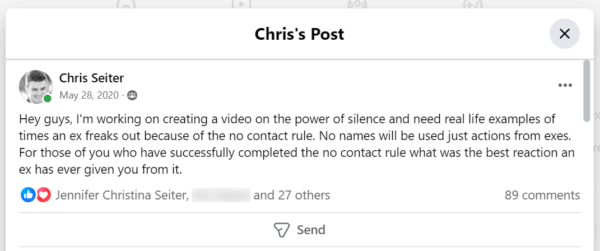
Basically it boiled down to the following questions:
“I’m working on creating a video on the power of silence and I need real life examples of freakouts by exes during the no contact rule.”
89 people responded with wild stories,
Like an ex admitting to starting fights just to get our client to talk to them,
Or sending a gif in a text saying “I will not be ignored”
Or by starting out sending rude/hateful messages and then doing a complete turnaround 27 days later.
But nothing… and I mean nothing stood out to me more than this comment,
Where this woman said her ex called her 72 times in 5 days over Facebook messenger and then literally goes on to give a day by day breakdown of how it all played out.
So, what is going on here? Is this normal?
Well, I think the average person would be inclined to believe that all the examples I just listed is simply a result of silence via the no contact rule. A positive consequence to it.
And everyone knows that silence makes your ex desperate, right? Right?
Well, yes…. And No…
It’s kind of complicated.

What Are Your Chances of Getting Your Ex Boyfriend Back?
Take the quizDoes Silence Actually Make Your Ex Desperate?
Let’s start first with this simple embedded idea into the breakup landscape that silence makes an ex miss you. The internet is littered with stories of people using silence (a la a no contact rule) on their ex and that ex “missing them.”
But as I just discussed in my video on the insane psychology of no contact an ex “missing you” and “contacting you” are two different things.
Check this out,

What Are Your Chances of Getting Your Ex Boyfriend Back?
Take the quizThis is a poll I conducted in our community where I asked individuals who completed the no contact how often their ex reached out to them during it.
64% of participants said they never heard from their ex.
And yet, every single success story I have ever interviewed swears by silence via the no contact rule.
How does this make any sense?
Well, believe it or not I think the answer to reconciling this paradox lies deep in this book.
We know from our own internal research that the vast majority of exes that we study have dismissive avoidant characteristics.
Now, the brilliance of a book like “attached” is it really helps us understand the psychology of what is going on with an ex when you are silent.
Amir Levine, M.D. and Rachel S.F. Heller, M.A. make a really interesting statement on page 114. They argue that:
Although you may be an avoidant your attachment “machinery” is still in place – making you just as vulnerable to separation. It’s only when your mental energy is needed elsewhere, and you are caught off guard do your emotions and feelings emerge.
And this is where it gets fun.
Scaling An Avoidants Walls Via Silence
You see, while the average ex we study is avoidant. Our average client tends to be anxious. This means that what the avoidant ex wants is space (they want to maintain their independence.) Meanwhile the anxious client wants re-assurance (or they want to fix things.)
And this interesting dynamic unfolds.
The avoidant pushes the anxious person away (naturally) and the anxious person attempts to pull the avoidant back towards them which just further causes the avoidant individual to dig their heels into the sand (keeping their guard up)
It’s only after the anxious person gives the avoidant person space a la a no contact rule that the avoidant can begin to direct more of their energies into other projects/people/things. Their walls become easier to scale and it’s easier to catch them off guard when you reach out to them.
Which, according to Attached means that the avoidant individuals true emotions and feelings can emerge.
And now we come back to our success stories.
On average the success stories I have had the pleasure of interviewing for my podcast have “gotten their exes back” usually around month 5 or 7. So, basically half a year.
And that’s AFTER they began working with me. Which means they could have been attempting to get their ex back for three months and failing before they ever attempted something like a no contact rule. All in all, it could take as much as 10 months before the average “success story” sees results.
That’s a long time but if you understand the psychology of how exes work it tracks.
The part that I don’t see anyone talking about with avoidants (the average ex that we’ve studied) and breakups is this idea of separation elation.
I don’t know if people are afraid of adding further heartbreak to an already difficult situation, but the reality is that most exes will be overjoyed at getting their freedom back.
Understanding The Nature Of Separation Elation and Anxiety
Check this out.

What Are Your Chances of Getting Your Ex Boyfriend Back?
Take the quiz
This is my famous avoidant death wheel which essentially tracks an avoidants entire experience from the beginning of a relationship to the end and then back to the beginning again.
It’s a cyclical cycle comprised of eight stages.
- I want someone to love me
- I found someone my problems are over
- Hey, I’m noticing some worrying things
- I think I need to leave the relationship
- I leave the relationships
- I’m so happy I left
- I’m starting to feel kind of lonely
- Why can’t I ever find the right person
Stage six is of course the separation elation phase. The stage where an ex is happy about getting their independence back. In the past I’ve even referred to this as a second honeymoon period. You can see in the graphic that it’s actually directly across the real honeymoon period,
And here’s the scariest part.
I can actually tell how successful someone will be at “getting their ex back” based on how they handle this stage.
You see, in my mind this is the make or break stage for most people because it’s how you react to your exes “overjoyed” nature that will either cause the ex to put more walls up or begin to distract themselves and slowly allow their walls to be scaled.
Remember, according to attached, It’s only when an avoidants mental energy is needed elsewhere, that they are caught off guard and allow their emotions and feelings emerge.
But it’s always funny to me. I feel like I’ve taught this exact lesson hundreds of times.
- Do no contact.
- Give an avoidant space
- Blah… Blah… Blah…
And the clients I’ve mostly worked with agree with me. They understand the psychology behind why it’s a good idea.
And yet they still don’t do it.
Because there’s no worse feeling than seeing someone you love so much discard you and enjoy the fact that they discarded you. Your anxiety takes over and you go into “fix it mode” at the exact wrong time telling yourself that even though you understand the basics. Even though you know you need to give an avoidant space. Your situation is the exception to the rule, right?
Except 9 times out of 10. It’s not.
But we’re really only talking about one part of the equation here. I’m not fool enough to subscribe to this idea that all you need to do is be silent and your ex magically comes back.
Subscribing To The Idea Of Active Silence
You need to be active in your silence.
Check this beauty of a quote from attachment resource, Free to Attach,
Avoidants are free to long for an ex once that person is unavailable out of the relationship, and typically out of contact so they are untouched by actual engagement and their deactivation systems aren’t triggered.
So, what you really need to do is NOT be silent for X amount of days and then start back up again. Rather, you need to throw yourself headlong into this idea of getting over your ex if you want “silence” to make them miss you.
Think about it logically there are really three core components that people point to as why silence should be the predominant strategy after a breakup.
You have:
Fear of Loss and Scarcity: Which suggests that people value what is rare or what they fear losing. So, when communication ceases, your ex might begin to perceive the relationship or the individual as more valuable, igniting a fear of loss.
But the thing I’ve learned about “fear of loss” is they need to fear losing you and if they see you sitting on your hands waiting for your “silence timer” to go off. It’s just more of the same.
Then of course you have:
Contrast Effect: If the relationship involved frequent and intense communication, the sudden shift to silence can create a stark contrast. This abrupt change can make the absence of communication feel more pronounced, leading to feelings of desperation.
Honestly this comes back to the separation elation thing I was talking about. Do you remember how I said I can tell how successful someone will be with their ex based on how they react to stage six of the death wheel?

What Are Your Chances of Getting Your Ex Boyfriend Back?
Take the quizWell, it plays directly into this contrast effect.
What you don’t want is to lose discipline and blow your exes phone up. Not only does that cause them to put more walls up but it doesn’t give them any kind of contrast at all.
Once again, it’s just more of the same.
Then of course you have:
Reflection and Idealization: Silence provides an opportunity for reflection. Sometimes, this leads to idealizing the past relationship and focusing more on positive memories, which can increase the desire to reconnect.
This is really the ball game in my opinion.
We know from that free to attach quote that an avoidant only allows themselves to miss you when they feel like there’s no chance of getting back together with you. That’s when they allow themselves to have this separation elation phase.
That’s when they start reminiscing about “phantom exes.”
But it all boils down to one simple fact.
Are you attempting to move on during the silence? For me this is always the single most difficult thing to get across to new clients. They are expecting me to give them these sexy words to say. Or this brilliant tactic.
Instead, all they get is a speech from me about the importance of looking like they are moving on in silence.
- Going on dates with new people.
- Starting a new hobby.
- Finding something that they care about just as much as their ex and pouring all their anxiety into that healthy outlet.
That’s what works. That’s what can make exes desperate.
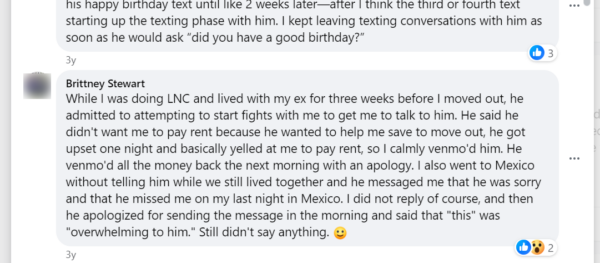


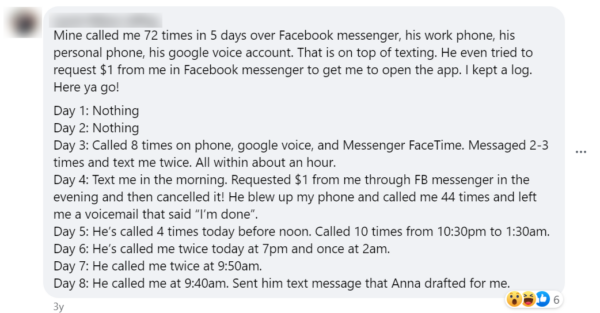
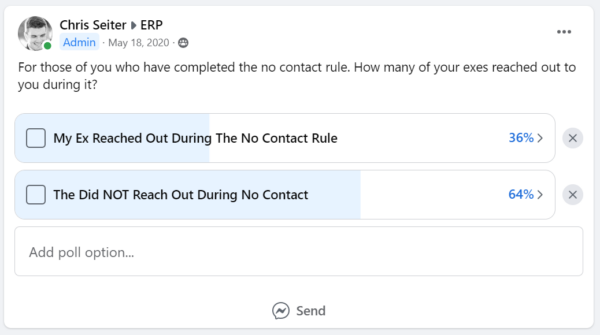
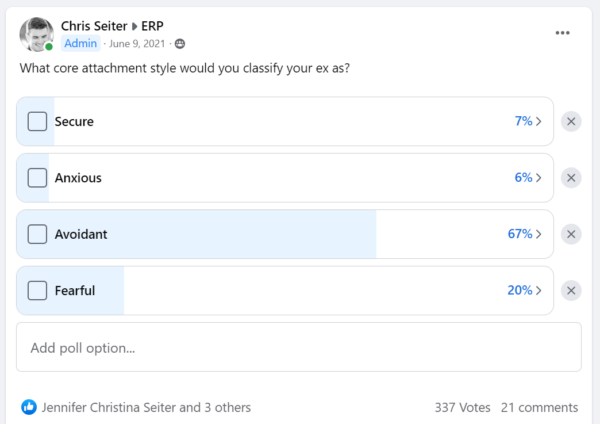
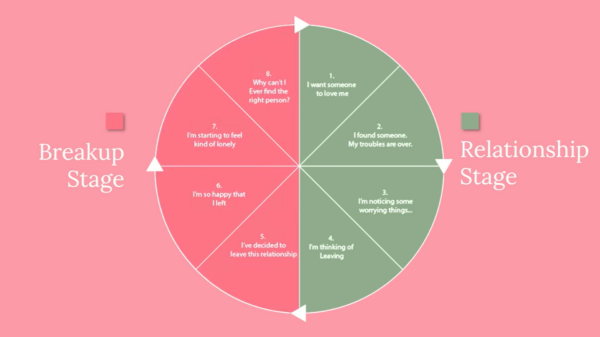
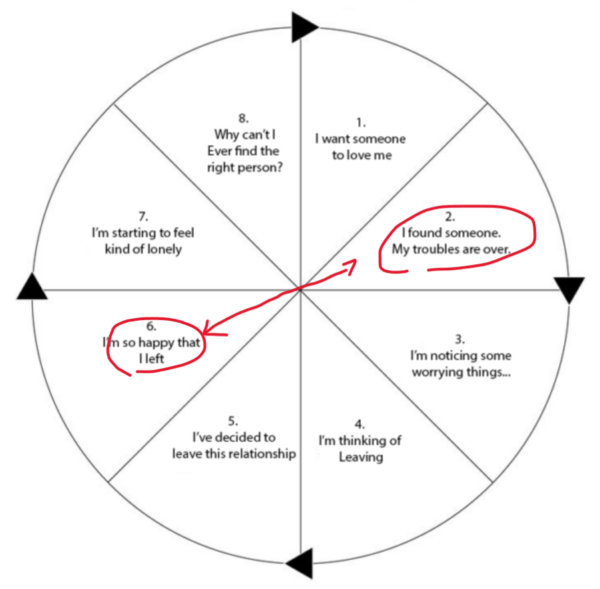
Sara
January 31, 2025 at 11:50 pm
I agree with your concept. A DA tried to leave me after forming a bond. I tried to get clarification from him in a calm manner, but he wasn’t able to give me a coherent answer. I told him “ok, I accept your no”. He’s still texting me every week and refused to come pick up his books. I dropped off the books at his place by leaving them at the front door without running the bell, took a picture, and left. Then I messaged him to let him know the books are at the front door. I ignored his reply. Several days later, he texted me asking me if I wanted to go with him to dinner and meet his friends. I ignored his invitation. I don’t feel triggered by his behavior. My question would be “why would I even want you back at this point?”.
Marvin yrn
June 20, 2024 at 12:26 pm
Very good